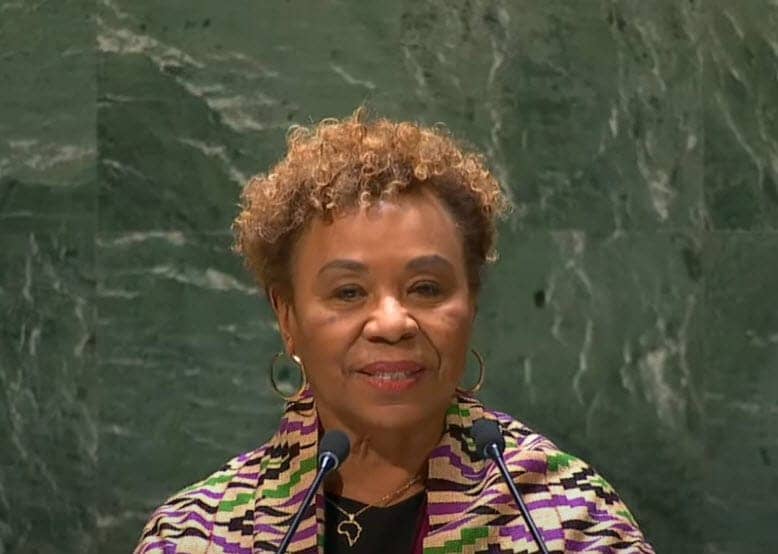
by Congresswoman Barbara Lee
Today, I had the incredible honor of addressing the United Nations General Assembly to commemorate the abolition of slavery. This is a rare privilege for members of Congress. Watch my speech here.
As the U.S. Congressional Representative to the UN, I believe it is critical to connect the experiences of people of African descent here in the U.S. with those globally.
The transatlantic slave trade forced millions of people from their homes, families, societies and countries, subjecting them to exploitation and dehumanization.
The painful legacy of slavery continues to impact this country through systemic racism. But I’m committed to a comprehensive approach to dismantling systemic inequity through legislation like H.R. 40, the Commission to Study and Develop Reparations Proposals for African Americans Act, and H.Con.Res. 19, Urging the Establishment of a Commission on Truth, Racial Healing, and Transformation.
Through these bills and legislation like the Emmett Till Antilynching Act of 2022, signed into law today by President Biden, we can begin to redress the legacy of the transatlantic slave trade and move toward racial equity and justice.
Despite these promising efforts, there is still so much work to do to achieve full equity in the United States and globally. I look forward to continuing that work towards justice.
Following is a transcript of my remarks at the United Nations:
Good morning. Thank you, Mr. President, and thank you, Mr. Secretary General.
Mr. President, I have the unique honor of addressing you on this important occasion as both a Member of Congress and one of this year’s United States Congressional Delegates to the United Nations General Assembly. As we commemorate the abolition of slavery and the transatlantic slave trade, let us reflect on the profound words of self-emancipated enslaved person, abolitionist, orator, global luminary and diplomat Frederick Douglass. “Abolition of slavery,” he said, “had been the deepest desire and great labor of my life.” These words prompt our remembrance of the victims and descendants of slavery and the transatlantic slave trade.
The transatlantic slave trade forced millions of people from their homes, families, societies and countries and subjected them to exploitation and dehumanization, creating a global enterprise of unparalleled wealth for Western nations and fueling the global economy. Chattel slavery remains an immoral and indelible stain on the history of the United States, the Western hemisphere and the collective chronicle of our inhumanity.
“Abolition of slavery had been the deepest desire and great labor of my life.” – Frederick Douglass
We acknowledge the myriad atrocities of slavery and continue to grapple with the racial, ethnic, gender, economic, social and political hierarchies it created. And yes, we must honor the victims of slavery by dismantling its institutional remnants, such as racism, discrimination, economic inequity, marginalization and systematic underdevelopment.
The United States must address the multidimensional legacies of slavery through an unprecedented commitment to racial equity, justice and inclusion within our borders and throughout our global affairs. We have demonstrated our commitment nationally through a government-wide approach to addressing systemic inequity.
Today, the president of the United States, Joseph R. Biden, will sign the Emmett Till Antilynching Act of 2022, recently passed by the United States Congress. It has been over 120 years since Congress’ first attempt to criminalize the horrendous act of lynching and yes, today, it will be finally made a federal hate crime.
Members of both House and Senate have supported legislation that acknowledges and addresses the remnants of our racialized past stemming from the institution of chattel slavery. Legislation like H. Con. Res. 19, urging the establishment of a United States Commission on Truth, Racial Healing, and Transformation; H.R. 40, a Commission to Study and Develop Reparation Proposals for African Americans; and H.R. 1280, the George Floyd Justice in Policing Act are all examples of how Congress is grappling with the need for systemic change and redress.
And last year, President Biden signed into law, making Juneteenth – that’s June 19th – a national holiday. It was on this day, in 1865, that Union soldiers arrived in Texas to announce that Black people were free. Now, this was two and a half years after the Emancipation Proclamation. This announcement was made in Galveston, Texas, which is the home of my grandfather and my great-grandmother.
Now on the global stage, we championed the establishment of the Permanent Forum on People of African Descent and supported the International Independent Expert Mechanism to Advance Racial Justice and Equality in Law Enforcement. And I, personally, fought for our participation in the movement to establish the beautiful Permanent Memorial Honoring the Victims of Slavery and the Transatlantic Slave Trade right here in a prominent spot at the United Nations. And I was honored to witness the establishment of the International Decade for People of African Descent.
Despite these promising efforts, there is still so much work to do to achieve full equity in the United States and globally. And so, we must embrace this momentous occasion as a clarion and dynamic call to engage and to move forward.
Thank you very much.
Congresswoman Barbara Lee has been representing California’s 13th District, comprising Oakland and surrounding cities, since 1998. She is the highest ranking African American woman in Democratic leadership, serving on the Budget Committee and the Appropriations Committee, which oversees all federal government spending. She can be reached at her Oakland office, 510-763-0370.





